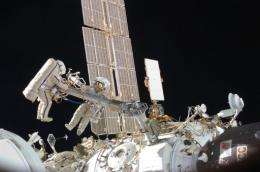A NASA handout image from February 16, 2012, shows Russian cosmonauts Oleg Kononenko (L) and Anton Shkaplerov, outfitting the International Space Station. A piece of an old Russian satellite whizzed by the ISS on Saturday, forcing its six-member crew to take temporary shelter in two Soyuz escape capsules, officials said.
A piece of an old Russian satellite whizzed by the International Space Station on Saturday, forcing its six-member crew to temporarily take shelter in two Soyuz escape capsules, officials said.
The incident was the third of its kind in more than a decade of continuous inhabitation of the orbiter, whose first element was launched by Russia in 1998, the US space agency NASA said in a series of Twitter updates.
The Russian space agency said the debris passed within 23 kilometres (14 miles) of the ISS, forcing the three Russians, two US astronauts and a Dutch member of the crew to relocate to the two Soyuz capsules on board.
According to NASA, Expedition 30 Commander Dan Burbank and Russian cosmonauts Anton Shkaplerov and Anatoly Ivanishin entered their Soyuz TMA-22 attached to the Poisk module, while cosmonaut Oleg Kononenko, NASA's Don Pettit and Andre Kuipers of the European Space Agency settled into their Soyuz TMA-03M capsule.
They waited for the debris to pass and exited to resume their normal duties, the US space agency said in a statement.
The Soyuz are attached to the ISS and used by crews either to return to Earth after their missions or in emergencies.
"The threat has passed," a Russian Mission Control Centre official told the Interfax news agency. "The cosmonauts have returned to performing their previously assigned work."
The last such incident was reported in June last year, when a piece of space junk passed within just 250 metres (820 feet) of the station.
Millions of chunks of metal, plastic and glass are whirling around Earth, the garbage left over from some 4,600 launches since the beginning of space exploration 55 years ago.
The rubbish comes mainly from old satellites and upper stages of rockets whose residual fuel or other fluids explode while they turn in orbit.
The Cosmos 2251 satellite whose debris passed by the station on Saturday was launched by Russia in 1993.
(c) 2012 AFP






















